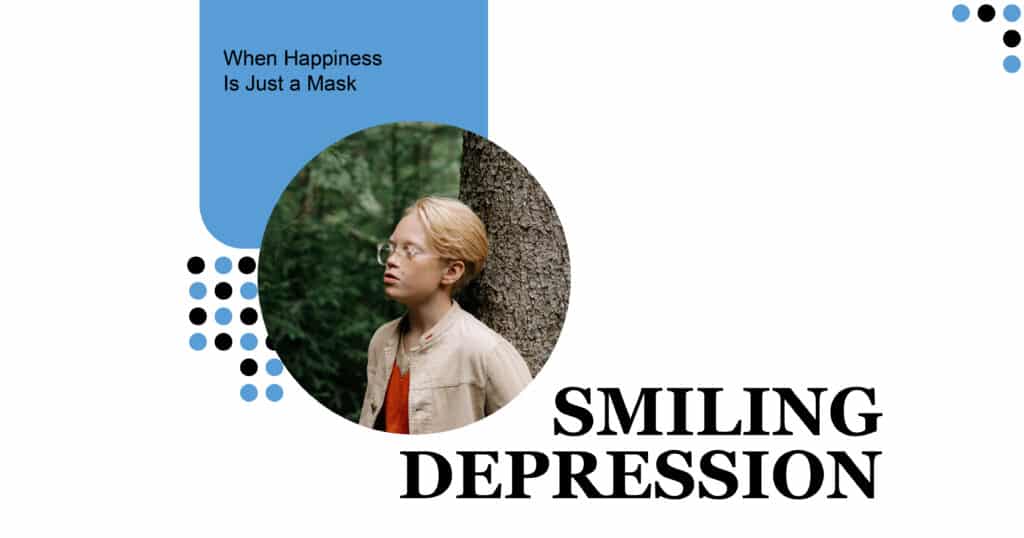At first glance, teens seem to be the happiest people around. They laugh heartily, balance tasks efficiently, and even go out of their way to show empathy towards others.
However, under that cheerful face and seemingly cordial personality, they are struggling with a form of depression called smiling depression, where people suffer from depression but appear happy on the outside.
If you have ever come across the question, “How do I know if I am depressed?” when you seem content on the surface or if you always have the notion that you feel happy but sad at the same time, you are in no way feeling something unusual.
This blog post will look into the indications of smiling depression, the motives for why individuals mask their suffering, and where to find help.
What Is Smiling Depression?
What Does It Mean to Be “Happy but Sad”?
Smiling depression is experienced by someone who hides emotional pain while acting happy and functional. Unlike conventional depression, which often has an individual expressively sad, but an individual with smiling depression goes through life maintaining everyday activities. They work, interact with people, and meet their obligations while feeling fatigued, drained, or hopeless.
This condition is interrelated with smile mask syndrome, which depicts a person wearing a metaphorical smile mask while hiding their true feelings. Those suffering from smiling depression often feel as if they would become a burden to others, or admit their issues would render them weak.
Smiling Depression Vs. Traditional Depression
In contrast to typical depression, which may include low energy, evident sadness, and social withdrawal, smiling depression can be pretty sinister. They may appear quite energetic and busy, but they are internally exhausted. To keep up the facade of happiness, they may even try to push themselves more, amplifying their suffering further. If not treated with the condition, this can be profoundly dangerous.

Signs and Symptoms of Smiling Depression
How Do I Know If I’m depressed?
Identifying smiling depression is challenging since the symptoms are hidden. Feeling emotionally drained from pretending to be happy, overcompensating with humor or productivity, and saying “I’m fine” when you’re anything but “fine” are typical traits. Smothering negative and self-critical sentiments despite achieving something, feeling disassociated with self and people are also telling signs.
The Hidden Cost of Wearing a Smile Every Day
Faking mental sharpness when one is feeling low can significantly affect the mental health of an individual. Warding off feelings can increase stress levels, cause sleep problems and fatigue, increase burnout possibilities, and promote dangerous ways of thinking. Numerous individuals do not understand how hurtful it could be to shoulder such a burden single-handedly.
Why Do People Hide Their Depression?
The Fear of Judgment
Multiple individuals experiencing smiling depression conceal their feelings due to the fear of being judged. Society, for example, equates happiness with success, which makes it difficult for them to acknowledge their struggles. This kind of fear tends to prevent individuals from getting the greatly needed help.
Not Wanting to Be a Burden
People do not seek help for numerous reasons, one being worrying about overburdening their friends and family. They often neglect to share their issues merely because they do not think it is important. Regardless, suffering in silence only intensifies the suffering.
The Social Media Pressure to Appear Perfect
Social media further promotes unrealistic happiness, which boosts smile mask syndrome. In reality, individuals tend to share edited snippets of their lives, creating the perception that everyone else is doing well as they face difficulties alone, and that further exacerbates the problem. It becomes increasingly more challenging to acknowledge that help is indeed required.
How to Break Free from Smiling Depression
Taking a Smiling Depression Test: A First Step
In case you believe that you might be suffering from smiling depression, a smiling depression test can help you evaluate your emotions better. Even though this test isn’t designed to substitute for a professional assessment, it can indicate if your hardships fit into the category of smile mask syndrome and if professional assistance should be pursued.
How to Explain Depression to Someone Who Doesn’t Understand
Going over smiling depression with a person who has never come across it before is not an easy task. It can use comparisons, like saying it’s an immense burden but no one can see. Also relatable and helpful is explaining familiar scenarios, like saying an actor puts on a smile while performing but feels hollow.
To encourage understanding, the statement, “I understand that I look okay on the outside, but on the inside, I am fighting a battle. All I need is assistance, not answers,” can help others understand what you are going through.

Seeking Professional Help: Therapy & Treatment Options
If your symptoms do not improve or change, it is very important to consult a healthcare provider. Therapies provide coping mechanisms, but physical activity, journaling, and mindfulness practices also help with symptom relief. A therapist can help guide one through the steps of processing emotions properly, leading to the adoption of healthier coping mechanisms.
Supporting Someone With Smiling Depression
Signs Someone You Love May Be Struggling
If a loved one appears to be satisfied but shows perplexing signs of stress, you should be concerned about smiling depression. They may over-apologize, minimize their real issues, retreat from emotional discussions, or even act as a buffer and resort to joking around.
How to Be a Supportive Friend or Family Member
Helping someone with smiling depression needs compassion and understanding. Even offering a listening ear in a non-judgmental manner, reassuring the individual, setting boundaries, and following up proactively can have significant impacts. Validating them by asking, “How are you feeling?” allows them to express their thoughts freely.
Get Support for Smiling Depression at Hillside Horizon for Teens
Hillside Horizon for Teens recognizes the struggle behind what some call laughing depression. Our therapists, counselors, and holistic treatment specialists are here to help you process your feelings and reacquire control of your life.
Asking for help does not demonstrate weakness, and it is an act of self-love. You do not have to continue living under the facade that everything is fine. Allow us to help you remove the mask and experience actual joy.
FAQs
What is smiling depression?
Smiling depression is a diagnosis in which individuals seem cheerful on the outside but on the inside fight battles with themselves. They hide their suffering behind a bright smile, making it challenging for people around them to understand how much pain they are in.
What are the symptoms of extreme depression?
Extra severe symptoms of depression include enduring sadness, lack of interest in previously enjoyed activities, social withdrawal, deep isolation, feelings of worthlessness, and persistent suicidal thoughts. With smiling depression, the symptoms are often masked behind a deceptive face, making it more challenging to identify.
Can smiling be a coping mechanism?
Correct, a lot of individuals with smiling depression use smiling to protect their true emotions and to avoid worrying people. They might need to keep a good impression even when suffering internally.
What are the stages of depression?
Depression usually evolves in a sequence beginning with denial, where the individual disregards symptoms to be followed by suppression, where the person actively conceals emotions. The subsequent struggle phase includes acknowledging the pain but keeping it hidden, which leads to a breaking point where an individual either seeks assistance or reaches a state of burnout. The concluding phase is healing, which encompasses accepting and treating depression.
How do you help someone who seems happy but is struggling inside?
When a person struggles in silence, the best thing you can do is have patience and be willing to listen without judgment. Sometimes, opening up is a hard enough step to take, so providing emotional support facilitates follow-through and consideration of professional help. You can make a difference here: remind them they don’t have to face the challenge alone.




